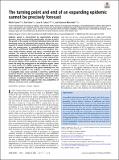Por favor, use este identificador para citar o enlazar a este item:
http://hdl.handle.net/10261/229053COMPARTIR / EXPORTAR:
 SHARE SHARE
 CORE
BASE CORE
BASE
|
|
| Visualizar otros formatos: MARC | Dublin Core | RDF | ORE | MODS | METS | DIDL | DATACITE | |

| Título: | The turning point and end of an expanding epidemic cannot be precisely forecast |
Autor: | Castro, Mario; Ares, Saúl CSIC ORCID ; Cuesta, José A. CSIC ORCID ; Manrubia Cuevas, Susanna CSIC ORCID | Palabras clave: | Predictability Epidemics Forecast Bayesian |
Fecha de publicación: | 20-oct-2020 | Editor: | National Academy of Sciences (U.S.) | Citación: | Proceedings of the National Academy of Sciences of the United States of America 117(42): 26190-26196 (2020) | Resumen: | Epidemic spread is characterized by exponentially growing dynamics, which are intrinsically unpredictable. The time at which the growth in the number of infected individuals halts and starts decreasing cannot be calculated with certainty before the turning point is actually attained; neither can the end of the epidemic after the turning point. A susceptible–infected–removed (SIR) model with confinement (SCIR) illustrates how lockdown measures inhibit infection spread only above a threshold that we calculate. The existence of that threshold has major effects in predictability: A Bayesian fit to the COVID-19 pandemic in Spain shows that a slowdown in the number of newly infected individuals during the expansion phase allows one to infer neither the precise position of the maximum nor whether the measures taken will bring the propagation to the inhibition regime. There is a short horizon for reliable prediction, followed by a dispersion of the possible trajectories that grows extremely fast. The impossibility to predict in the midterm is not due to wrong or incomplete data, since it persists in error-free, synthetically produced datasets and does not necessarily improve by using larger datasets. Our study warns against precise forecasts of the evolution of epidemics based on mean-field, effective, or phenomenological models and supports that only probabilities of different outcomes can be confidently given. | Versión del editor: | http://dx.doi.org/10.1073/pnas.2007868117 | URI: | http://hdl.handle.net/10261/229053 | DOI: | 10.1073/pnas.2007868117 | ISSN: | 0027-8424 | E-ISSN: | 1091-6490 |
| Aparece en las colecciones: | (CNB) Artículos |
Ficheros en este ítem:
| Fichero | Descripción | Tamaño | Formato | |
|---|---|---|---|---|
| Turning-point_Castro_Art_2020.pdf | 852,75 kB | Adobe PDF |  Visualizar/Abrir |
CORE Recommender
PubMed Central
Citations
61
checked on 07-may-2024
SCOPUSTM
Citations
88
checked on 26-may-2024
WEB OF SCIENCETM
Citations
70
checked on 25-feb-2024
Page view(s)
105
checked on 29-may-2024
Download(s)
9
checked on 29-may-2024

